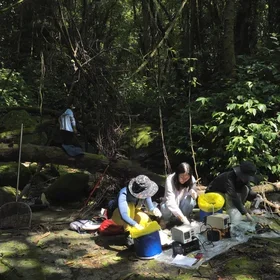By Tom Watson, lecturer in the M.S. in Nonprofit Management program, School of Professional Studies
As a consultant who has worked with hundreds of clients over the past 25 years in the nonprofit sector, I’m sometimes asked who my favorite was. The answer is always the same: the Tuskegee Airmen, particularly Colonel Charles McGee.
Back in the 2000s, it was an honor to serve as a consultant to the Airmen, who were beginning a project that would eventually become the Tuskegee Airmen National Historic Site at Moton Field in Tuskegee, Alabama. My colleague Karen Davis and I traveled around Alabama to take the temperature of major corporate and foundation supporters for the project. On some of those visits, we were joined by Colonel McGee, who was then in his mid-80s, a combat pilot who became a major figure in the successful battle to desegregate the U.S. military. He commanded the respect of everyone we met on that trip.
Colonel McGee was an extraordinary nonprofit leader deeply committed to his cause. In Leadership & Management of Nonprofits, a core course in the M.S. in Nonprofit Management program, we discuss McGee’s four P’s for how to structure leadership: “Perceive, Prepare, Perform, and Persevere.”
The mantra, adapted from planning combat operations against the Nazis in Europe, could support any nonprofit theory of change, engage any board of directors, and power any strategic plan. These management guidelines undergird a system for thinking about leadership that encourages the core idea of institutional strength—a quality that’s far undervalued in this era of extremist politics and angry populism.
Our organizations and institutions matter in solving the world’s greatest problems and making life better and fairer for millions. We need them to be stronger, more resilient, more adaptable, less hidebound, and more economically sustainable. This is true of large multinational NGOs, small neighborhood-based community service organizations, giant billion-dollar philanthropies, and small start-ups. In each case, applying the McGee rubric can be used to build greater institutional strength.
Perceive
What is the problem we are trying to solve? What are the true community needs? What’s the landscape for our work? For a consultant, it’s often surprising to see how many nonprofit organizations do not regularly ask themselves these questions. As McGee might say, they’re too often “fighting the last war” and not fully up-to-date and aware of current conditions. Great leaders are constantly listening.
Prepare
Planning is undervalued. Every nonprofit organization of a certain size will create a strategic plan every five years or so. Why? Because foundation donors will ask to see them. Great planning demands a full reconsideration of the mission and detailed preparation. This might include increasing or reorganizing staff, launching a major capital campaign, or moving into a new area of service. Planning should be yearly, centered on the annual budget discussion.
Perform
Performance comes down to effective management and accurate measurement of results. Creating new metrics for impact is something of a hot item in our sector, but really, the results of our work have always been there if you knew where to look and your organization was committed to making sure donor money was well spent. But performance is also about the value of the 12.5 million people who work for U.S. nonprofits, more than 10 percent of the private workforce in this country. Their labor is both the single greatest expense in the overall nonprofit budget and our greatest value.
Persevere
There will always be another major crisis coming—a recession, a pandemic, or large-scale conflict—as well as small-scale hurdles to be cleared: a lost foundation grant, a disappearing board, a change in government policy, or legal and accounting issues. But the commitment to the cause itself demands perseverance and built-in resiliency in organizations.
The nonprofit “establishment”—which is a liberal communitarian structure of building and sustaining a better society—needs strengthening. Thankfully, our own program at Columbia is bringing both talent and commitment to a sector that is crying out for both.
About the Program
Columbia University’s M.S. in Nonprofit Management prepares graduates for leadership roles within mission-driven organizations in a wide variety of contexts, including global and community nonprofits, foundations, education, health care, and the arts, or as fundraising and development experts.



